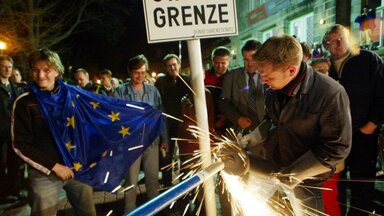20 years of EU enlargement
Complete Integration

Warsaw, Mazovia, Poland - People celebrate Poland's accession to the EU on the Castle Square (Plac Zamkowy).
© picture alliance / Caro | BastianOn May 1, 2004, ten countries joined the EU: Estonia, Latvia, Lithuania, Malta, Poland, Slovakia, Slovenia, the Czech Republic, Hungary and Cyprus; two more followed suit on January 1, 2007: Bulgaria and Romania; the last member to join was Croatia on July 1, 2013.
The wave of accession, which began exactly 20 years ago, has become a gigantic economic success story. To see this, you only have to watch the traffic on the freeways that lead from Germany to the eastern parts of Central Europe: the freeway A 2 between Hanover and Berlin, the A3 between Nuremberg and Passau, the A 4 between Erfurt and Görlitz, the A 8 between Munich and Salzburg or the A 14 between Magdeburg and Dresden. What can you see there? Masses of modern trucks with license plates from Central and Eastern European countries, above all of course from particularly large Poland, driving from the West to the East or from the East to the West: to or from Poland, Estonia, Latvia or Lithuania, and to or from the Czech Republic, Slovakia, Slovenia, Hungary, Bulgaria, Romania or Croatia.
The statistics confirm this casual observation. All Central and Eastern European accession countries, with the exception of Romania, currently have an export quota that is significantly higher than the EU-average - and only slightly lower in the case of Romania. In terms of their foreign trade and economic structure, they are today fully integrated into the intra-European value chains. They have attracted masses of direct investments from industrial companies in the West and have developed their own national economic prowess. All of this can also be seen in the statistics of their gross domestic product; they show all of them to have caught up massively over the last 20 years and today. Depending on how you measure it exactly, their per capita incomes are 70 to 90 percent of the EU-average.
What a gigantic success story! To appreciate what it means, it helps to have reached a certain mature age, like the author of these lines. Then you will remember the conditions of the 1970s and 1980s, when occasionally - but really only occasionally - completely outdated trucks from the socialist East groaned along the German highways. They were strange vehicles from the crudest period of industrialization, rattling and stinking, threatening to fall apart at any time.
In short, there is no economic reason whatsoever not to congratulate the EU on its integration achievement. Most credit of course must go to the people in the accession countries themselves; after all, they did the hard work. But a part of the achievement can be rightly attributed to the clever support from the EU. It should come as no surprise that there is still a long way to go for the EU’s Eastern members to catch up “on a par” with the highest Western standards. The last 20 percent to reach the top are always the most difficult, as many years of experience have shown, not only in central and eastern Germany, but also in western latecomer countries such as Spain. After all, the "last few meters” to the top are about matching the innovative strength of the western technology hubs - and that is not so easy. It remains the big task for the future.
Hence there is reason to stay motivated and to strive for more, but also - after 20 years – there is reason to feel content and satisfied. It is a bit sad that this positive development is not fully and proudly reflected in the politics of all accession countries. Until recently, the PiS-governed Poland or Viktor Orbán's Fidesz-governed Hungary did or still do not really full political to the Eu and its cooperative spirit of integration. That is a pity. But it should not discourage politicians - neither in Brussels nor in Berlin. Post-communist Europe is and remains a great example of successful integration. It shows how newly established market economies can gain strength even after the worst of socialist experiments. Integration works, even after 40 years of a planned economy.
“Europe falters, but it did not fail”. This was also the encouraging message from Timothy Garton Ash at his magnificent Isaiah Berlin Lecture at the National Liberal Club in London, organized by Liberal International with the support of the Friedrich Naumann Foundation for Freedom, which applies here as well.
20 Years after EU's Big Bang Enlargement: Milestones, Missteps, and the Road Ahead

The 20th anniversary of the EU's largest enlargement prompts reflection on its impact. The enlargement secured peace, democracy, and economic growth but faces criticism for leniency towards rule-of-law violations of some of the members. It is more vital than ever that Europe reinforces liberal values amidst global uncertainties and advocates for continued enlargement with a focus on fostering democracy.
